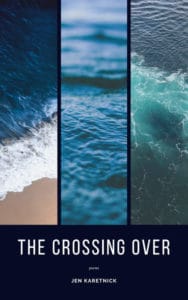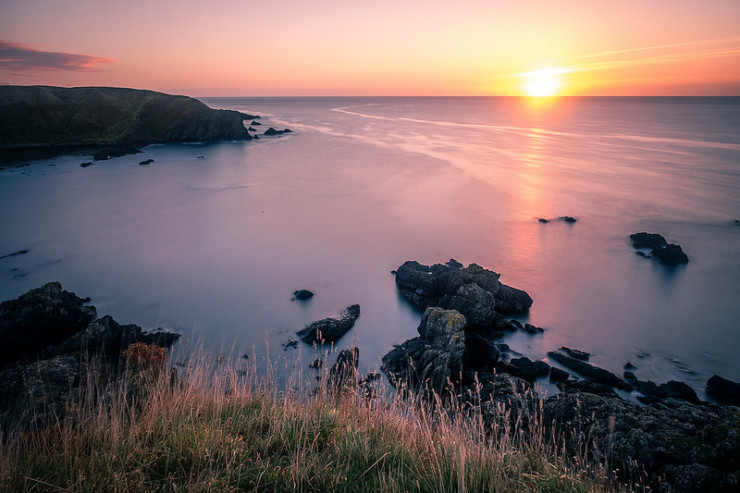My earliest memory of the ocean is the salt smell. My family lived in New Orleans, and we took a short vacation to Biloxi, on the Mississippi Gulf Coast. What I remember is walking in wet sand, my mother holding my three-year-old hand attached to my three-year-old self, listening to the white birds overhead, and smelling salt. The water was green, stretching forever into the distance. The ocean was an event, an experience, and a painting.
Later I would come to experience the ocean as a playground, a place to investigate in the shallows, a source of shells and fish and strange creatures better avoided, like jellyfish. Once, when I was 17 and right out of high school, the Atlantic served as a kind of bedroom, as friends and I slept the night on a beach near Cape Kennedy in Florida. Much later, when I traveled to Europe or Hawaii, the ocean became flyover territory, something to get across to reach a destination.
To read the 21 poems of Jen Karetnick’s new collection The Crossing Over is to find all of these metaphors of the ocean and more. The ocean is something to get across, to explore, to taste and smell, to be threatened by, to live upon, to watch, to learn from, to be buried in. The ocean has its own history, psychology, theology, and language. It is a playground for three-year-olds and a cemetery for countless ships and airplanes. It offers its bounty but demands its sacrifices.
At times these poems evoke the smell and taste of salt, as if the ocean seasons the memory. Perhaps the ocean rolls off the beach, quietly observing the moving specks on the sand, sending its waves to remind us of our transience, or, as Karetnick writes, that we are “a brief dream the ocean once had.”
Yearn

greater than any gods, you sew
nettles into imaginary dough, veto
the unsettled tears of pioneers.
I am a brief dream the ocean
once had. A blip of phosphorescence.
Factory-made luminescence
in the maw of a wave’s promotion.
There is nothing, nothing more,
once we reach the horizon.
We are a stitch in the incision
as the unobtainable orange soars.

Jen Karetnick
She writes of ferries and dinghies, of shipwrecks and plane crashes. She takes us aboard freighters and ships. And we understand that, while we have our experiences and write our personal ocean poems, the ocean abides.
Karetnick received an MFA in poetry from the University of California-Irvine and an MFA in fiction from the University of Miami. She is the author of several poetry collections and chapbooks, including Prayer of Confession, Landscaping for Wildlife, Bud Break at Mango House, Brie Season, and Necessary Salt, among others.
Today I live some 750 miles from the ocean, but I still hear its waves and feel its winds. I respect it more than I did when I was 17, or 3. The poems of The Crossing Over remind me that I am temporal and the ocean is eternal, and it possesses a wisdom I will never know. Karetnick has done something rather marvelous here.
Related:
Jen Karetnick: Pondering the Often Invisible
Poetic Voices: Jen Karetnick and E. Kristin Anderson
Photo by Giuseppe Milo, Creative Commons, via Flickr. Post by Glynn Young,author of Poetry at Work and the novels Dancing Priest, A Light Shining, Dancing King, and the latest, Dancing Prophet.
__________________________

“I require all our incoming poetry students—in the MFA I direct—to buy and read this book.”
—Jeanetta Calhoun Mish
- Poets and Poems: Sandra Marchetti and “Diorama” - April 24, 2025
- Poets and Poems: Christina Cook and “Roaming the Labyrinth” - April 22, 2025
- Longfellow’s “Paul Revere’s Ride”: Creating a National Legend - April 17, 2025

Michele Morin says
Thanks, Glynn! This is a new name to me, but obviously one I need to investigate.
Ocean poems . . . ahhhh!
L.L. Barkat says
I love hearing about your childhood experiences, Glynn. 🙂
Also, this:
“And we understand that, while we have our experiences and write our personal ocean poems, the ocean abides.”
As we go into April (Poetic Earth Month & National Poetry Month), I’m thinking this collection feels like the perfect companion.
Maureen says
I think of the ocean as a birthplace as well, as inspiring as it is fear-inducing.
Lovely collection.
Sandra Heska King says
Well, you know I need this.